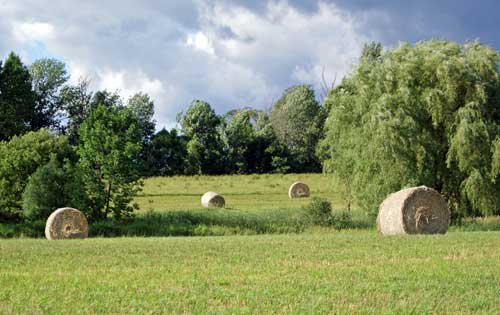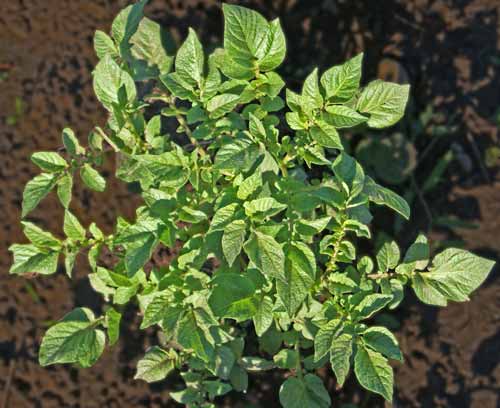

Ever since the 1970’s I have been attracted to the potential for the peri-urban farms that were expropriated for the (now defunct) Pickering Airport east of Toronto. I was always ready to provide agronomic advice to whomever was working to save these farms.

Many of us were excited to hear in the 2011 budget announcement that the federal government was preparing to turn the Rouge River Park into a National Park. Last winter I formed a discussion committee with George Brown’s Chef Gary Hoyer and Urban Ecologist Peter Mitchell. Then I met with Parks Canada to present our ideas for many ways the forthcoming park’s farmland could benefit Toronto’s food community. These Sustainable Farms were just the sort of use they wanted to include within the park.
I am regularly receiving requests from non-farm establishments to assist in responding to more customer demand to become “more sustainable”. This is much more complicated than many suppose. The first issue is to define what they mean by “sustainable”. Then there are a lot of bad habits to change.
Some of our sustainable ideas included:
The formal announcement for Canada’s first Urban National Park was on May 25th 2012. By July, Parks Canada will be announcing the process for public input of the Park’s farmland use.
Contact Parks Canada to have them send notices directly to you. Or if you would like to be part of a coalition please let me know. Some of you may recall how much good work was accomplished by the Toronto Culinary Guild during the 1980’s. I managed this by creating meaningful 4-hour jobs that I assigned one to each of our 250 members each year. If there is sufficient interest, we could do this again!
The Ontario Ministry of Agriculture recently called a meeting for the Farm Financial Advisors who are helping Ontario farmers. As a neophyte consultant I received some helpful tips from experienced advisors. Nearly all of them are (or were) accountants or bankers and have primarily done work for conventional farms. Since they do not always feel sufficiently qualified to help alternative farmers, some offered to refer them to me.
From the work I have done, I have frankly been surprised how few farms have complete Financial Statements and even fewer have any form of Business Plan. We were told that fewer than 20% of farmers actually make use of these important business tools. It seems as though most farmers are cheating themselves out of a fair living. This is going to eventually affect all of us. As evidenced by the average age of farmers already exceeding 57 years, their children are not entering the field. Who will be growing our food?

In 2008 the Federal and Provincial governments introduced the 5 year multi-billion dollar Growing Forward program. Unfortunately, most of this is for Business Risk Management, which is actually heavily subsidized insurance policies that keep risky monoculture farms afloat. Our cheap food system can only be maintained with this enormous taxpayer support. Organic and ecological agriculture systems have the built-in security of mixed crop rotations that in effect negate any need for crop insurance. Since there are few government supports for sustainable systems, the purchaser pays these added costs (not the taxpayers). This is why organic seems more expensive.
Only about 13% of the Growing Forward funds are for Strategic Initiatives (which are the supports useful for organic farmers). The most popular program is cost sharing for adopting Ecological Farming Practices. But there was a new Business Development for Farm Business (BDFB) program that is of particular benefit for alternative farmers. The government will pay 50% (75% for “new farmers”) to take skills development courses and prepare a business plan.
Everyone in support of local sustainable agriculture should contact your MP and MPP (well before its completion in September) to say you want the BDFB Strategic Initiatives to be retained in Growing Forward 2. In case these Strategic Initiatives are not continued, farmers should immediately take advantage of the original programs before they expire in December 2012!
The 10 warmest winters on record have occurred since 1998. It is unbelievable that anyone can still doubt the climate is changing! It is not about less skiing. It is that fluctuations are becoming more extreme. Tolerance to extremes is one of the important ways organic (i.e. with increased soil organic matter) agriculture excels. While at Cookstown Greens I conducted research that indicated soil-life and the organic-matter it feeds on are important contributors to both increased flavour and longer shelf-life.
Improved flavour
Longer shelf-life
This research is now being continued by the University of Guelph. However, they have not yet been able to obtain full funding. Nevertheless, a cut-back version of this research is being done this summer in one of the allotment gardens in Guelph’s Ignatius Jesuit Centre.

Governments are of the opinion that taxpayers think agricultural research only benefits the less than 2% of the population (i.e. the farmers) directly involved in farming. (Somehow we must remind them that the agri-food industry is Canada’s largest employer – with over 12% of our population.) Currently 85% of agriculture research funding comes from corporations, trade associations, and foundations. They expect returns on their funding investments. Since we are not researching any proprietary products, none of them determined a way to get a return on investing in improved flavour and shelf-life.
Might a restaurant, the Canadian Restaurant and Foodservices Association (CRFA), or a foundation with a mandate for better food make the initial (say 25% of the required $100,000) investment? Governments do become interested in this “for the public good research” after there has been some initial private investment. Please let me know what ideas you have for keeping this research moving forward.
| forward to a friend and suggest signing up to receive this newsletter every month. |